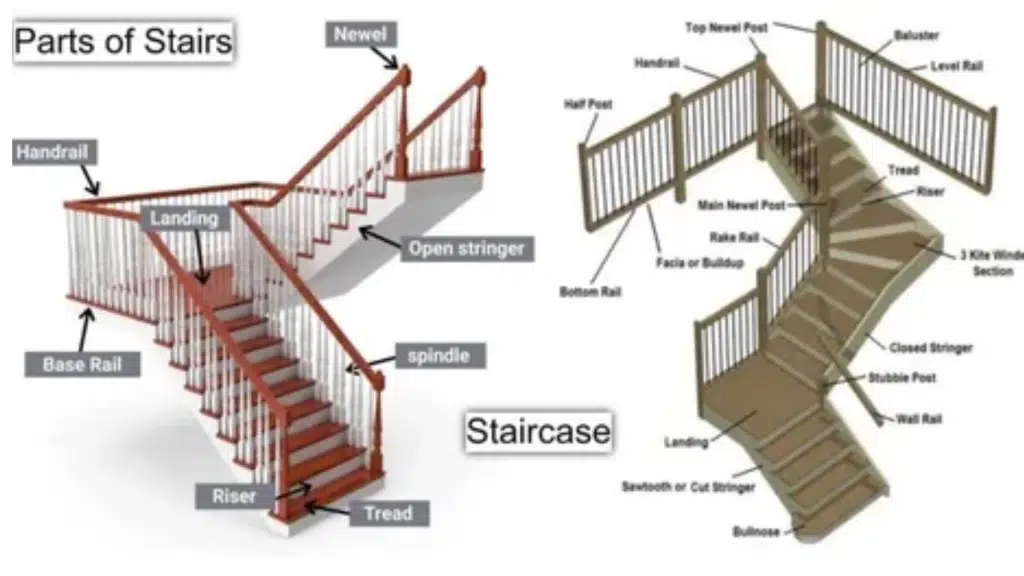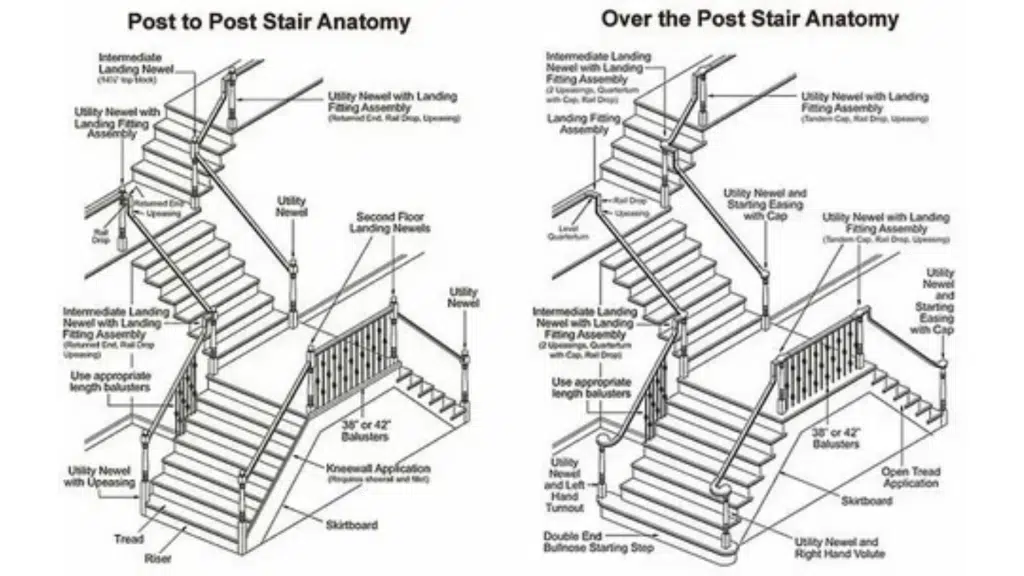Stairs are more than just a way to move between levels; they’re a blend of engineering, safety, and style. Whether you’re planning a new build, renovating your home, or simply curious about stair anatomy, understanding the names and functions of each part helps ensure comfort, durability, and design harmony. Below is a clear, straightforward guide to the 20 stair parts names you’ll encounter in any professional blueprint or conversation.
Introduction to Stair Anatomy
Every stair system is composed of multiple elements that work together for strength, safety, and aesthetics. From the visible steps you tread on to the hidden supports beneath, each part has a special role. Familiarity with these names will empower you to communicate effectively with contractors, select the right materials, or even tackle DIY improvements.
Here is a clear and organized table of the 20 stair parts names with numbering for easy reference:
| No. | Stair Part Name |
|---|---|
| 1 | Tread |
| 2 | Riser |
| 3 | Stringer |
| 4 | Nosing |
| 5 | Carriage |
| 6 | Flight |
| 7 | Landing |
| 8 | Newel Post |
| 9 | Baluster (Spindle) |
| 10 | Stringer Cover |
| 11 | Handrail |
| 12 | Volute |
| 13 | Handrail Bracket |
| 14 | Base Shoe (Quarter Round) |
| 15 | Skirt Board |
| 16 | Winder |
| 17 | Balustrade |
| 18 | Spandrel |
| 19 | Bullnose Tread |
| 20 | Stringer Bracket |
Structural Components of a Staircase
These core parts form the framework and support of any stair assembly.

1. Tread
The flat, horizontal surface you step on. Treads must be wide enough for secure footing and finished to resist slipping.
2. Riser
The vertical board between each tread. Risers can be open (creating a floating look) or closed (for more traditional styles).
3. Stringer
The angled backbone on each side (or in the center) that holds treads and risers in place. Stringers can be cut—notched—or housed to receive the treads.
4. Nosing
The rounded or angled edge of the tread that overhangs the riser below. Nosing improves safety by increasing tread depth at the front.
5. Carriage
Another term for a stringer—often used in older or formal architectural references.
6. Flight
A continuous series of steps between two landings. Large staircases may have multiple flights.
7. Landing
A flat platform between flights. Landings provide a resting spot, change direction, and meet building-code requirements for long runs.
8. Newel Post
A sturdy vertical post at the start or end of a stair flight (and at every turn). Newels anchor the handrail and balustrade.
9. Baluster (Spindle)
The vertical posts or spindles that support the handrail. Balusters can be simple dowels or intricate wrought-iron designs.
10. Stringer Cover
A decorative board that hides the raw edge of an open stringer, often matching the stair’s finish.
Decorative & Safety Features
Beyond the main structure, these elements enhance appearance, protect users, and round out the staircase’s aesthetic.
11. Handrail
The continuous rail you grasp for support. Handrails must be smooth, at a comfortable height, and securely fastened.
12. Volute
A spiraled handrail end, often found at the bottom newel post in classic designs.
13. Handrail Bracket
Metal fittings that secure the handrail to the wall or posts. Proper bracket spacing is crucial for stability.
14. Base Shoe (Quarter Round)
A trim molding at the bottom of a baseboard or stringer, concealing gaps between trim and flooring.
15. Skirt Board
A wide trim piece running along the wall beside stairs, hiding the joint between wall and stair structure.
16. Winder
A triangular or pie-shaped tread that turns a stair flight without a landing. Common in space-saving or spiral-like staircases.

17. Balustrade
The collective term for the ensemble of handrail, balusters, and newel posts—essentially the guardrail system.
18. Spandrel
The triangular wall space under a flight of stairs. It can be left open or enclosed with paneling or storage.
19. Bullnose Tread
A specially curved or rounded front tread used at the bottom or top of a flight to create a graceful entry.
20. Stringer Bracket (Hidden Bracket)
Metal supports installed on wall stringers to carry the weight of treads invisibly, giving a “floating” effect.
Conclusion
Knowing these 20 stair parts names empowers you to discuss renovation plans, read architectural drawings, or simply appreciate the craftsmanship beneath your feet. Each component from the sturdy stringer to the elegant volute plays a vital role in safety and style. Keep this guide handy next time you encounter stair design or maintenance, and you’ll step confidently into any project.
